
Яницкая Л. К. Английский в дипломатии и политике. Часть 1 (I)
.pdf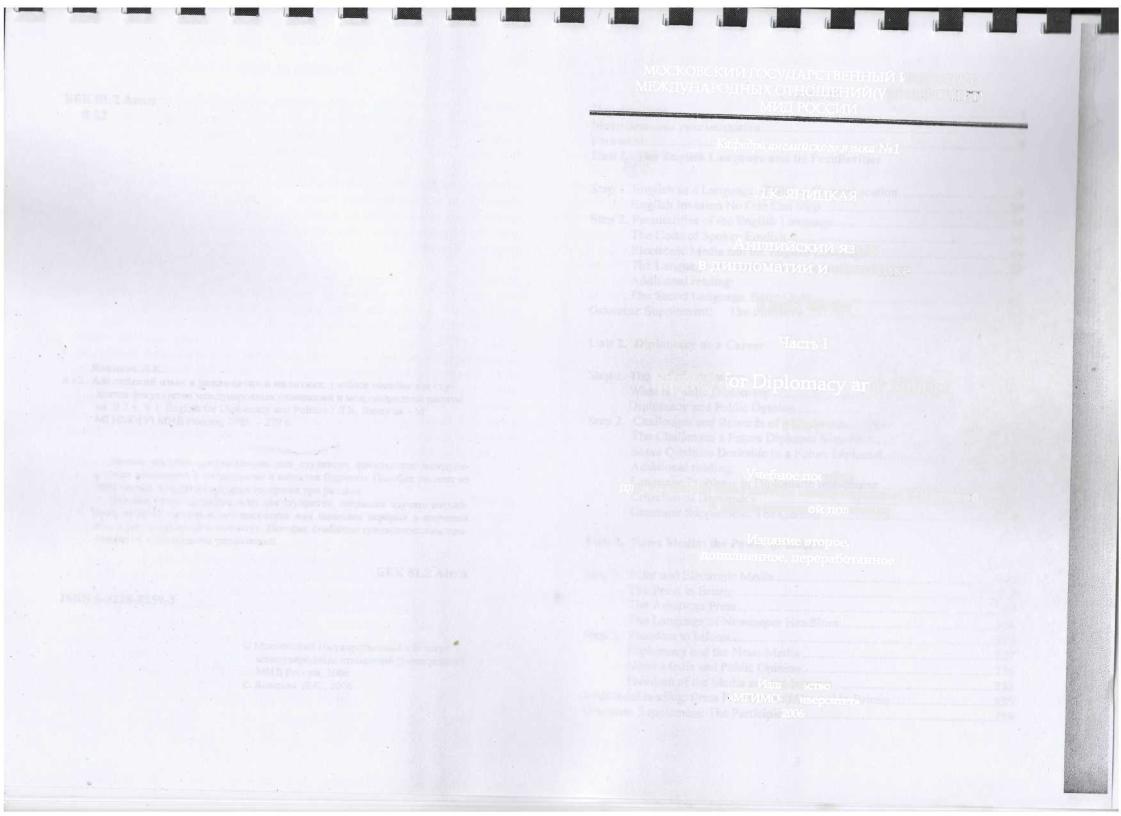
московский ГОСУДАРСТВЕННЫЙ институт
МЕЖДУНАРОДНЫХ ОТНОШЕНИЙ(УНИВЕРСИ'Пл I) МИД РОССИИ
Кафедра английского языка №1
Л.К. ЯНИЦКАЯ
А Н Г Л И Й С К И Й Я З Ы К
в дипломатии и политике
В двух частях
Часть I
English for D i p l o m a c y a n d Politics
Parti
Учебное пособие для студентов факультетов международных отношений
и международной политики
Издание второе, дополненное, переработанное
Издательство «МГИМО-Университет» 2006
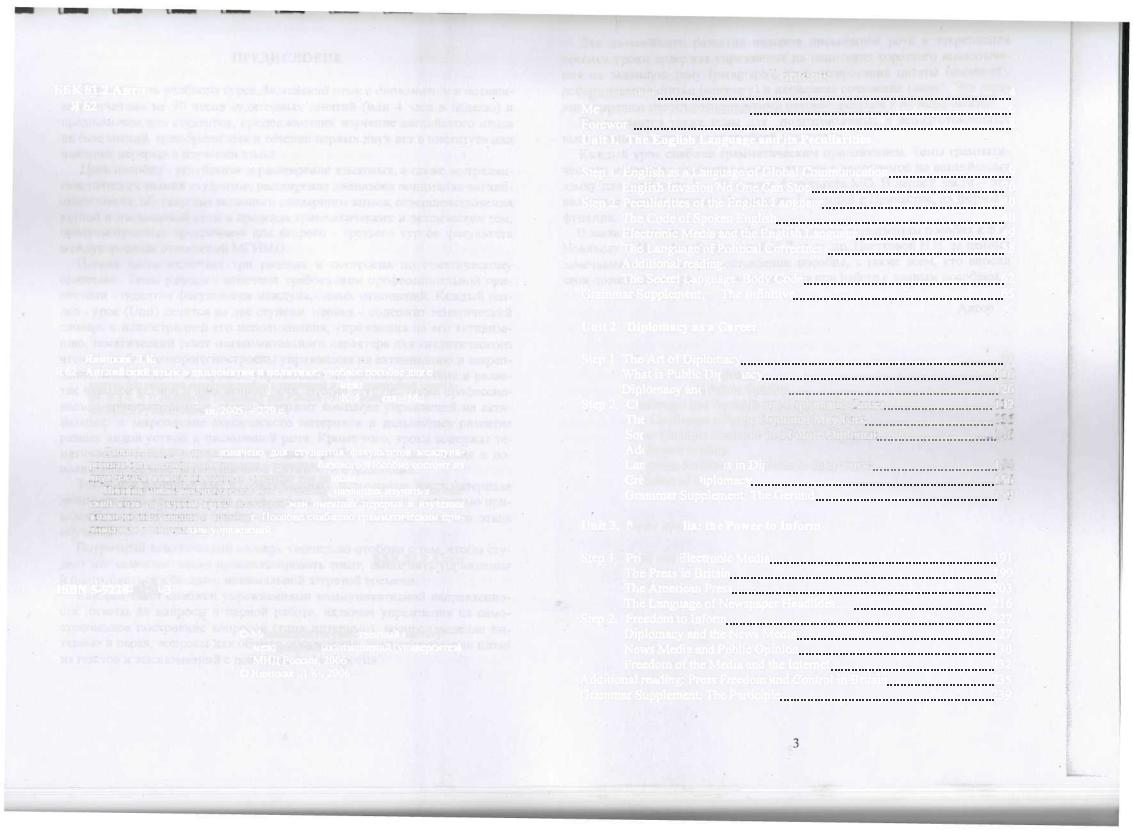
ББК 81.2 Англ Я 62
Яницкая Л.К.
Я 62 Английский язык в дипломатии и политике: учебное пособие для студентов факультетов международных отношений и международной политики. В 2 ч. Ч 1: English for Diplomacy and Politics / Л.К. Яницкая ~ M.: МГИМО(У) МИД России, 2005. - 279 с.
Данное пособие предназначено для студентов факультетов международных отношений и ПОЛИТОЛОГИИ в качестве базового. Пособие состоит из лнух ЧАСТОЙ, КАЖДАЯ и1* которых содержит три раздела.
Пособие ГМСЖС предназначено для студентов, начавших изучать английский тык на первом курсе института или имевших перерыв в изучении 11ЫК1 ДО Поступления в институт. Пособие снабжено грамматическим принижением с комплексом упражнений.
ББК 81.2 Англ
ISBN 5-9228-0259-3
©Московский государственный институт международных отношений (университет) МИД России, 2006
©Яницкая Л.К.,2006
|
C o n t e n t s |
|
Предисловие |
4 |
|
Методические рекомендации |
6 |
|
Foreword |
8 |
|
Unit I. The English Language and its Peculiarities |
|
|
Step 1. English as a Language of Global Communication |
9 |
|
|
English Invasion No One Can Stop |
20 |
Step 2. Peculiarities of the English Language |
40 |
|
|
The Code of Spoken English |
40 |
|
Electronic Media and the English Language |
49 |
|
The Language of Political Correctness |
58 |
|
Additional reading: |
|
|
The Secret Language. Body Code |
62 |
Grammar Supplement: The Infinitive |
65 |
|
Unit 2. Diplomacy as a Career |
|
|
Step 1. The Art of Diplomacy |
98 |
|
|
What is Public Diplomacy |
116 |
|
Diplomacy and Public Opinion |
126 |
Step 2. |
Challenges and Rewards of a Diplomatic Career |
I 12 |
|
The Challenges a Future Diplomat May Fact |
l *<» |
|
Some Qualities Desirable in a Future Diplomat |
\46 |
|
Additional reading: |
|
|
Language Problems in Diplomatic Intercourse |
154 |
|
Criticism of Diplomacy |
I 56 |
|
Grammar Supplement: The Gerund |
139 |
Unit 3. News Media: the Power to Inform |
|
|
Step 1. |
Print and Electronic Media |
191 |
|
The Press in Britain |
199 |
|
The American Press |
203 |
|
The Language of Newspaper Headlines..... |
...216 |
Step 2. |
Freedom to Inform |
227 |
|
Diplomacy and the News Media |
227 |
|
News Media and Public Opinion |
230 |
|
Freedom of the Media and the Internet |
232 |
Additional reading: Press Freedom and Control in Britain |
235 |
|
Grammar Supplement: The Participle |
239 |
|
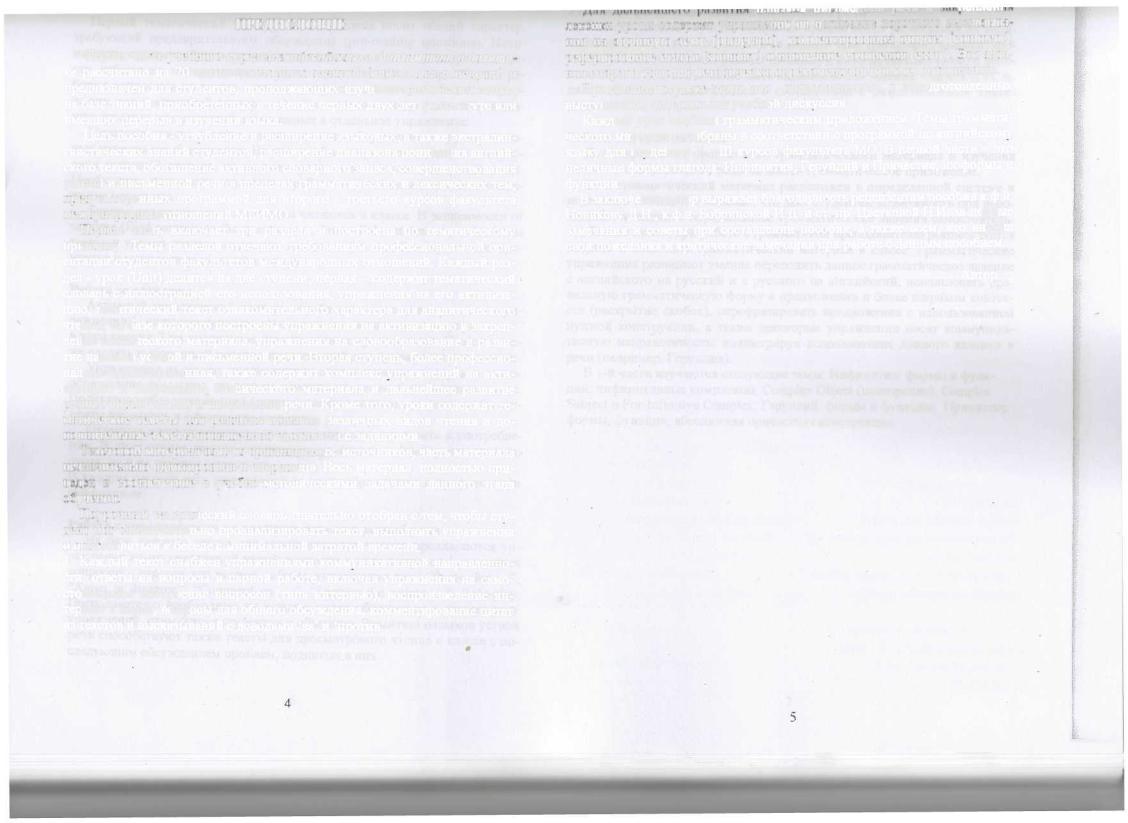
ПРЕДИСЛОВИЕ
Первая часть учебною курса Английский язык в дипломатии и политы
ке рассчитано на 70 часов аудиторных занятий (или 4 часа в неделю) и предназначен для студентов, продолжающих изучение английского языка на базе знаний, приобретенных в течение первых двух лет в институте или имевших перерыв в изучении языка.
Цель пособия - углубление и расширение языковых, а также экстралингвистических знаний студентов, расширение диапазона понимания английского текста, обогащение активного словарного запаса, совершенствования устной и письменной речи в пределах грамматических и лексических тем, предусмотренных программой для второго - третьего курсов факультета международных отношений МГИМО.
Первая часть включает три раздела и построена по тематическому принципу. Темы разделов отвечают требованиям профессиональной ориентации студентов факультетов международных отношений. Каждый раздел - урок (Unit) делится на две ступени: первая - содержит тематический словарь с иллюстрацией его использования, упражнения на его активизацию, тематический текст ознакомительного характера для аналитического чтения, на базе которого построены упражнения на активизацию и закрепление лексического материала, упражнения на словообразование и развитие навыков устной и письменной речи. Вторая ступень, более профессио- нально-ориентированная, также содержит комплекс упражнений на активизацию и закрепление лексического материала и дальнейшее развитие разных видов устной и письменной речи. Кроме того, уроки содержат те- матические тексты дни раЗВЭТИЯ навыков различных видов чтения и до-
полнитсльные гекёты повышенной сложности с заданиями.
Текстовой материал взят из оригинальных источников, часть материала
Незначительно адаптирована И сокращена. Весь материал полностью при-
м< к II и соответствие с у1 icon о-методическими задачами данного этапа (И [учения
I [оурочный тематический словарь тщательно отобран с тем, чтобы студент мог самостоятельно проанализировать текст, выполнить упражнения и подготовиться к беседе с минимальной затратой времени.
Каждый текст снабжен упражнениями коммуникативной направленности: ответы на вопросы в парной работе, включая упражнения на самостоятельное построение вопросов (типа интервью), воспроизведение интервью в парах, вопросы для общего обсуждения, комментирование цитат из текстов и высказываний с доводами сза* и 'против'.
i i.i in-i r\« >п n u t i i m w n r i u n i r w i n n |
irviKivni |
|
к м ш и уроки содержа! упражнения на написание короткого выска >ывя кия ii.'i I ада иную гему (paragraph), комментирования цитаты (comment),
реферирование статьи (summary) и написание сочинения (essay),' >тм задания сопровождаются методическими рекомендациями к их выполнению.
Предлагаются также темы для подготовленных и неподготовленных выступлений, материал для учебной дискуссии.
Каждый урок снабжен грамматическим приложением. Темы грамматического материала отобраны в соответствии с программой по английскому язык}/ для студентов II - III курсов факультета МО. В первой части - это неличные формы глагола: РТнфинитив, Герундий и Причастие, их формы и функции.
В заключение автор выражает благодарность рецензентам пособия к.ф.н. Новикову Д.Н., к.ф.н. Бобринской И.Д. и ст. пр. Цветковой Н.И. за ценные замечания и советы при составлении пособия, а также всем, кто вносил свои пожелания и критические замечания при работе с данным пособием.
Автор

Мерный тематический TCKCI каждого раздела пост общий характер, требующий предварительного обсуждения (pre-reading questions). Начинающим студентам рекомендуется письменно ответить на вопросы к тексту, избегая его цитирования, но используя активный словарь. Парная работа с вопросами по тексту заставляет студентов повторить как его содержание, так и активный словарь. Особое внимание надо уделить пониманию трудных предложений, вынесенных в отдельное упражнение.
Пересказу текста должно предшествовать обсуждение на уроке основных пунктов его содержания. Важно, чтобы в пересказе студенты употребляли активный словарь, но не повторяли слово в слово авторский текст. I [еобходимо напомнить студентам требования написания краткого содержа пня (summary).
Тексты для просмотрового чтения читаются в классе. В зависимости от задания (Find answers to the questions..., True - False statements ...), длины текста и уровня группы студентам дается от 2-х до 10 минут на его прочтение и выполнение заданий к тексту.
Работа со слов дрем Активный тематический словарь отрабатывается в классе и дома в уп-
ражнении 1, иллюстрирующем использование активного словаря, и в упражнении 2 на правильное использование производных. Полезно так-
же сделать выборочный перевод предложений для лучшего их понимания. Упражнения на замену подчеркнутых слов активным словарем и словообразование помогают студентам запоминать слова и их использование. Подстановочные упражнения (тексты) следует задавать на дом, чтобы сту-
денты вдумались в содержание контекста.
Отдельно иллюстрируются слова, вызывающие трудность в употреблении В ном случае даются упражнения не только на выбор правильного слона, по II ил переиоде русского.
И К§ЖДОМ разделе сен, упражнения на словообразование с префиксами и
суффиксами
Работа С упражнениями на развитие навыков устной речи На базе каждого текста для аналитического чтения предлагаются уп-
ражнения коммуникативной направленности в виде вопросов / косвенных вопросов - ответов для парной работы, упражнения типа "Prove that "Agree or disagree", "Comment on ...", "Discuss the points ...", Role-play. Преподавателю необходимо на каждом уроке обращаться к такому роду упражнений, стимулируя студентов к общению. Развитию навыков устной речи способствуют также тексты для просмотрового чтения в классе с последующим обсуждением проблем, поднятых в них.
гмютя и«> раиштшо плимкоп письменной речи В конце каждой ступени студентам предлагаются упражнения на напи-
сание либо короткого сочинения на данную тему (paragraph), комментирования цитаты (comment), резюме (summary), либо сочинения (эссе) с напоминанием о том. как должно быть выполнено это задание. Оценка этих заданий должна осуществляться в соответствии с разработанными критериями.
Работа над грамматикой Для закрепления пройденного грамматического материала и изучения
нового в конце каждого раздела дается грамматическое приложение.
Весь грамматический материал расположен в определенной системе и подается в таблицах и моделях, что дает студентам возможность при необходимости изучить определенные грамматические явления самостоятельно. Тем не менее, при работе с грамматикой преподавателю рекомендуется вводить и объяснять грамматический материал в классе. Грамматические упражнения развивают умение переводить данное грамматическое явление с английского на русский и с русского на английский, использовать правильную грамматическую форму в .предложении и более широком контексте (раскрытие скобок), перефразировать предложения с использованием нужной конструкции, а также некоторые упражнения носят коммуникативную направленность, иллюстрируя использование данного явления в речи (например, Герундия).
В 1-й части изучаются следующие темы: ИнфинИТИВ формы И фуН! ции; инфинитивные комплексы: Complex (Object (повторение), (lomplc Subject и For-Infinitive Complex; Геру иди и формы И функции ПриЧК ГИС
формы, функции, абсолютная причастная конструкция
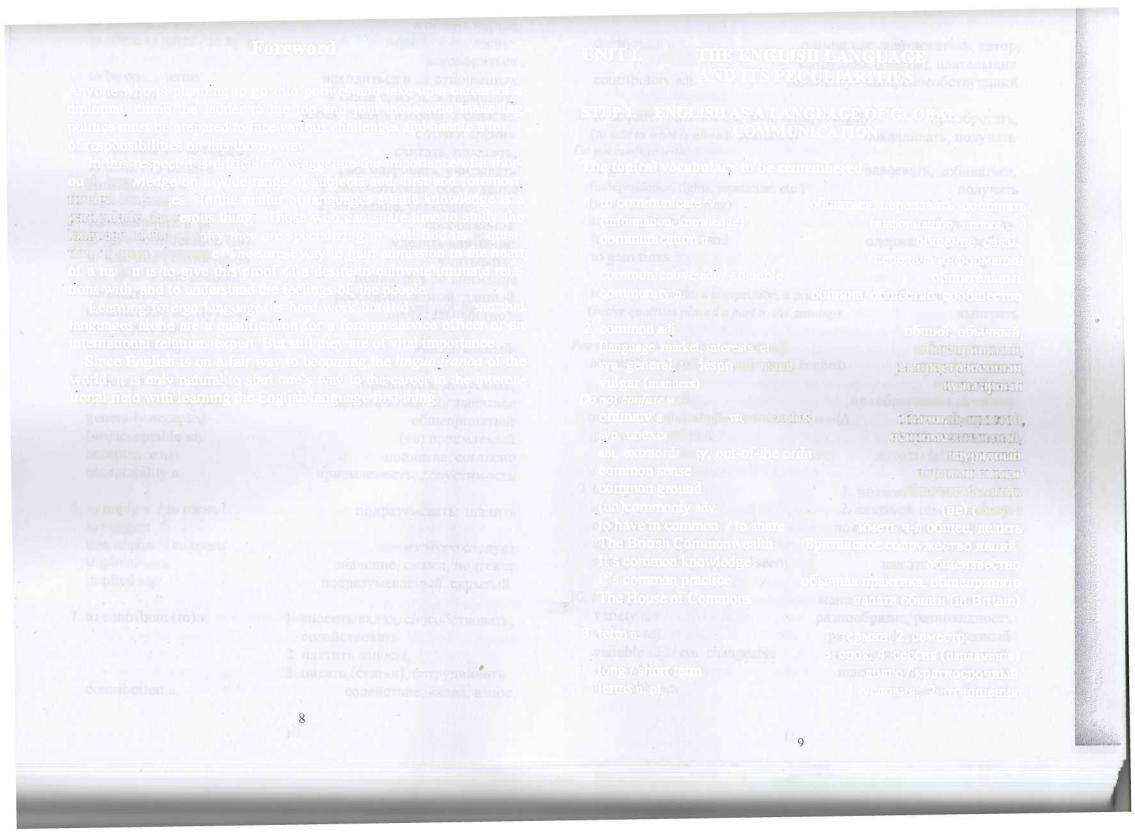
F o r e w o r d
Anyone who is planning to go into politics and take up a career of a diplomat climb the ladder to the top and join those who make big politics must be prepared to face various challenges and handle a lot of responsibilities on this thorny way.
In this respect it is difficult to exaggerate the importance of a thorough knowledge on a wide range of subjects and, first and foremost foreign languages. Tn the matter of languages a little knowledge is a particularly dangerous thing'. Those who can spare time to study the language of the country they are specializing in, will find its acquisition of great advantage. The surest way to gain admission to the heart of a nation is to give this proof of a desire to cultivate intimate relations with, and to understand the feelings of, the people.
Learning foreign languages is hard work but it does not mean that languages alone are a qualification for a foreign service officer or an international relations expert. But still they are of vital importance.
Since English is on a fair way to becoming the lingua franca of the world, it is only natural to start one's way to the career in the international field with learning the English language first thing.
UNIT t THE ENGLIS H LANGUAGE AND ITS PECULIARITIES
STEP 1. ENGLISH AS A LANGUAGE OF GLOBAL COMMUNICATION
The topical vocabulary to be remembered
1. to communicate v. (information, knowledge) communication n.
communicative adj. / sociable community n.
общаться, передавать, сообщать (информацию, знания, ,..)
общение, связь, передача информации общительный община, общество, сообщество
2.common adj.
(language, market, interests, etc.) syn. general widespread, usual,
vulgar (manners)
Do not confuse with
ordinary adj. (people, words, clothes) syn. unexceptional
ant. extraordinary, out-of-the ordinary common sense
common ground (un)commonly adv.
to have in common / to share The British Commonwealth It's common knowledge
It's common practice The House of Commons
3.term n.
long / short term terms n. pi.
общий, обычный,
общепринятый,
распространенный,
вульгарный
обычный, и рос ГОЙ
непримечательный,
заурядный
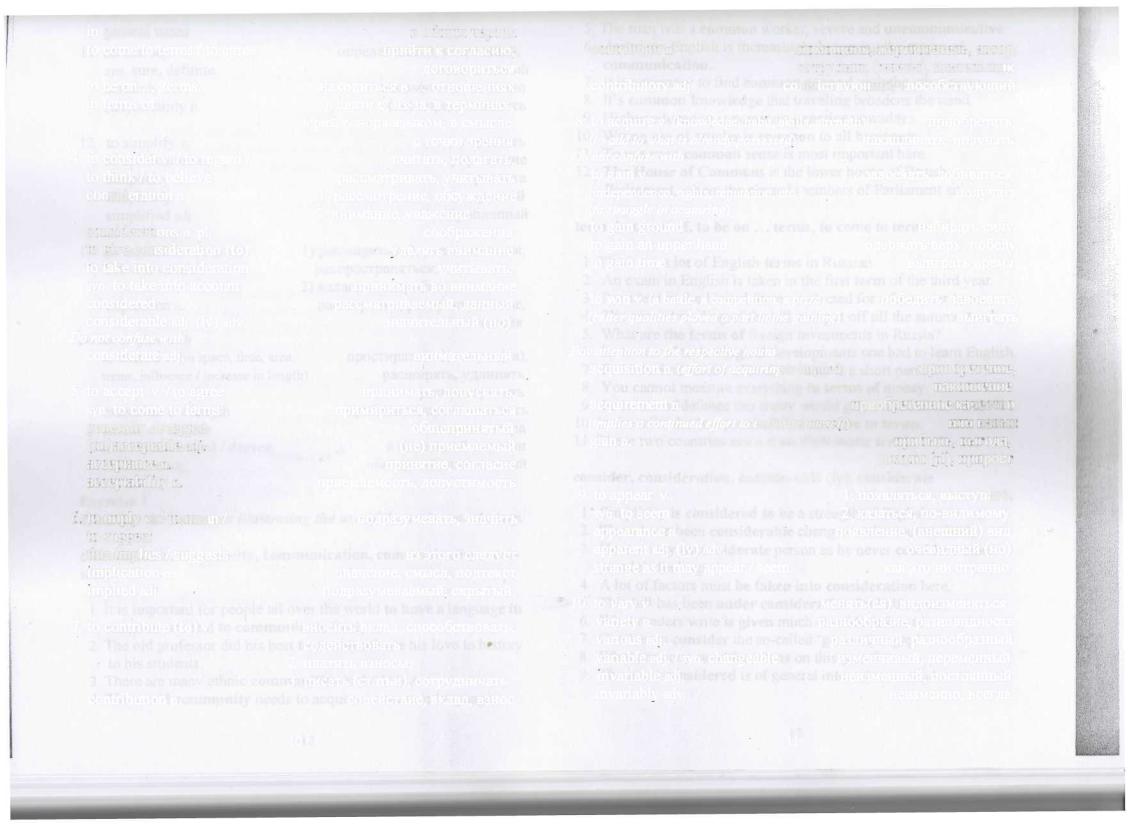
in general terms |
в общих чертах |
to come to terms / to agree |
прийти к согласию, |
|
договориться |
to be on ... terms |
находиться в ... отношениях |
in terms of |
в связи с, из-за, в терминах, |
|
через, говоря языком, в смысле, |
|
с точки зрения |
4. to consider v. / to regard / |
считать, полагать, |
to think / to believe |
рассматривать, учитывать |
consideration n. |
1. рассмотрение, обсуждение |
|
2. внимание, уважение |
considerations n. pi. |
соображения |
(o give consideration (to) |
уделять внимание |
to take into consideration |
учитывать, |
syn. to take into account |
принимать во внимание |
considered |
рассматриваемый, данный |
considerable adj. (ly) adv. |
значительный (но) |
Do not confuse with |
|
considerate adj. |
внимательный |
5. to accept v. / to agree |
принимать, допускать, |
syn. to come to terms |
примириться, соглашаться |
generally accepted |
общепринятый |
(un)acccplahle ndj |
(не) приемлемый |
acceptance n |
принятие, согласие |
acceptability и |
приемлемость, допустимость |
6 to imply v. / to mean / |
подразумевать, значить |
to suggest |
|
this implies / suggests... |
из этого следует |
implication n. |
значение, смысл, подтекст |
implied adj. |
подразумеваемый, скрытый |
7. to contribute (to) v. |
1. вносить вклад, способствовать, |
|
содействовать |
|
2. платить взносы; |
|
3. писать (статьи), сотрудничать |
contribution n. |
содействие, вклад, взнос |
|
10 |
contributor п. |
помощник, жертвователь, автор, |
||
contributory adj. |
сотрудник (газеты), плательщик |
||
содействующий, способствующий |
|||
8. to acquire v. (knowledge, habit, skills, strength) |
приобретать, |
||
(to add to what is already possessed) |
накапливать, получать |
||
Do not confuse with |
|
|
|
to gain v. |
|
завоевать, добиваться, |
|
(independence, rights, reputation, etc.) |
|
получать |
|
(to struggle in acquiring) |
|
|
набирать силу |
to gain ground |
|
|
|
to gain an upper hand |
|
одержать верх, победу |
|
to gain time |
|
|
выиграть время |
to win v. (a battle, a competition, a prize) |
победить, завоевать, |
||
(better qualities played a part in the gaining) |
выиграть |
||
Pay attention to the respective поит |
|
|
|
acquisition n. (effort of acquiring is implied) |
|
приобретение, |
|
|
|
|
накопление |
acquirement п. |
приобретенное KtHOCtlO |
||
(implies a continued effort to cultivate oneself) |
|
mm НЯВШ |
|
gainn. |
|
|
прибыль, HMI ода, |
|
|
доходы (pi), прИрОС! |
|
9. to appear v. |
1. появляться, выступать; |
||
syn. to seem |
2. казаться, по-видимому |
||
appearance n. |
появление, (внешний) вид |
||
apparent adj. (ly) adv. |
|
|
очевидный (но) |
strange as it may appear / seem |
как это ни странно |
||
10. to vary v. |
менять(ся), видоизменяться |
||
variety n. |
разнообразие, разновидность |
||
various adj. |
различный, разнообразный |
||
variable adj. / syn. changeable |
изменчивый, переменный |
||
invariable adj. |
неизменный, постоянный |
||
invariably adv. |
|
|
неизменно, всегда |
|
11 |
|
|
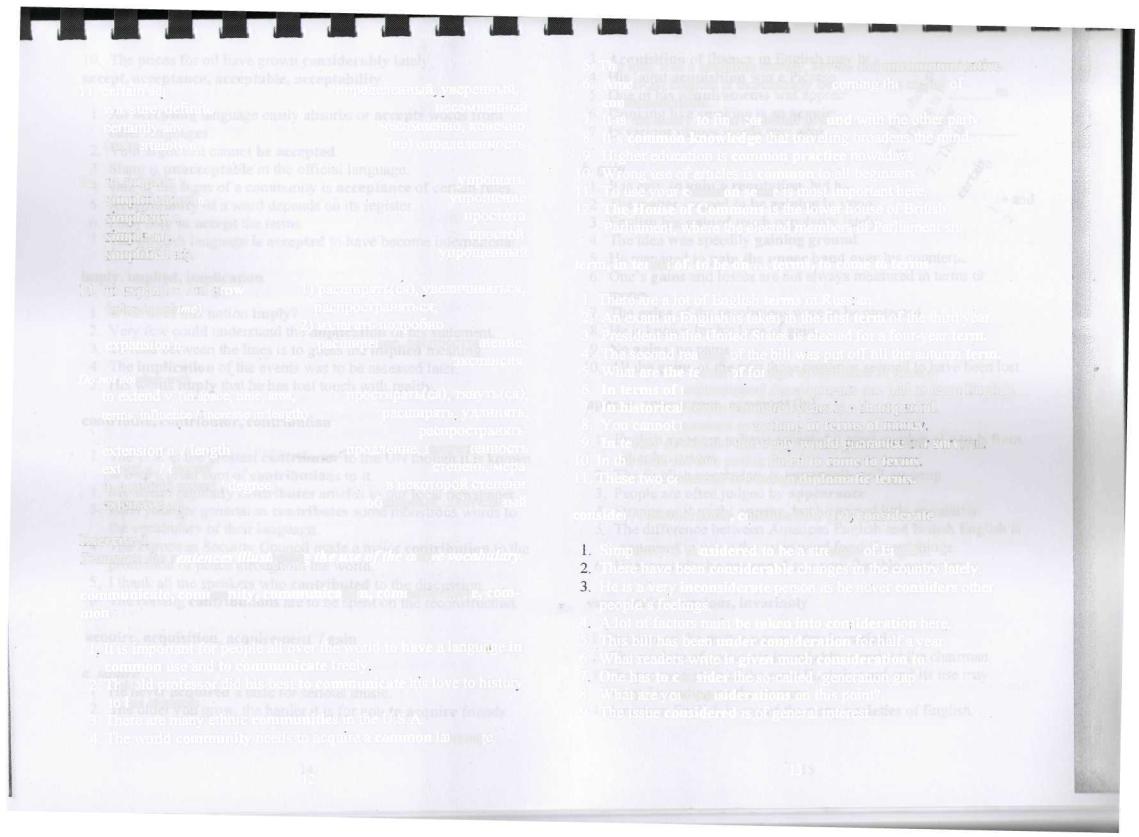
11. |
certain adj. |
определенный, уверенный, |
|
|
syn. sure, |
definite |
несомненный |
|
certainly adv. |
несомненно, конечно |
|
|
(uncertainty n. |
(не) определенность |
|
12. |
to simplify v. |
упрощать |
|
|
simplification n. |
упрощение |
|
|
simplicity |
n. |
простота |
|
simple adj |
|
простой |
|
simplified |
adj, |
упрощенный |
13. |
to expand v. / to grow |
1) расширять(ся), увеличиваться, |
|
|
(often in volume) |
распространяться; |
|
|
|
|
2) излагать подробно |
|
expansion n. |
расширение, распространение, |
|
|
|
|
экспансия |
Do not confuse with
to extend v. (in space, time, area, terms, influence / increase in length)
extension n. / length extent n. / degree
to a certain extent / degree extensive adj.
простирать(ся), тяяуть(сяХ расширять, удлинять, распространять продление, протяженность степень, мера в некоторой степени
обширный, длительный
Exercise l
Translate the sentences illustrating the use of the active vocabulary.
communicate, community, communication, communicative, common
1 It is important for people all over the world to have a language in common use and to communicate freely
2.The old professor did his best to communicate his love to history to his students.
3.There are many ethnic communities in the U.S.A.
4.The world community needs to acquire a common language.
12
5.The man was a common worker, severe and uncommunicative.
6.American English is increasingly becoming the means of communication.
7.It is necessary to find common ground with the other party.
8.It's common knowledge that traveling broadens the mind.
9.Higher education is common practice nowadays.
10.Wrong use of articles is common to all beginners.
11.To use your common sense is most important here.
12.The House of Commons is the lower house of British Parliament, where the elected members of Parliament sit.
term, in terms of, to be on ... terms, to come to terms
1.There are a lot of English terms in Russian.
2.An exam in English is taken in the first term of the third year.
3.President in the United States is elected for a four-year term.
4.The second reading of the bill was put off till the autumn term.
5.What are the terms of foreign investments in Russia?
6.In terms of technological developments one had to learn English. 1, In historical terms a hundred years is a short period.
8.You cannot measure everything in terms of monej
9.In terms of defence this treaty would guarantee oui sin viva!
10.In the talks the two parties failed to come to terms
11.These two countries are not on diplomatic terms*
consider, consideration, considerable (ly). considerate
Simplicity is considered to be a strength of English.
There have been considerable changes in the country lately. He is a very inconsiderate person as he never considers other people's feelings.
4A lot of factors must be taken into consideration here.
5.This bill has been under consideration for half a year.
6.What readers write is given much consideration to.
7 One has to consider the so-called 'generation gap'.
8.What are your considerations on this point?
9.The issue considered is of general interest.
13

10. The prices for oil have grown considerably lately. accept, acceptance, acceptable, acceptability
1. An accepting language easily absorbs or accepts words from
|
other languages. |
2. |
Your argument cannot be accepted. |
V Slang is unacceptable in the official language. |
|
4. |
One of the signs of a community is acceptance of certain rules. |
5, |
Acceptability of a word depends on its register. |
6I had only to accept the terms.
7The English language is accepted to have become international.
Imply» implied, implication
I WIKII does this notion imply?
2. |
Very lew could understand the implication of his statement. |
3. To read between the lines is to guess the implied meaning. |
|
4. |
The implication of the events was to be assessed later |
5. His words imply that he has lost touch with reality. |
|
contribute, contributor, contribution |
|
I |
The 11 S is the greatest contributor to the UN though it is known |
|
to owe i j»roal sum of contributions to it. |
|
Mv friend regularly contributes articles to our local newspaper, |
i luich younger generation contributes some monstrous words to |
|
|
the vocabulary of their language. |
I |
Ilic European Security Council made a major contribution to the |
|
promotion of peace throughout the world. |
5.I thank all the speakers who contributed to the discussion.
6.The coming contributions are to be spent on the reconstruction.
acquire, acquisition, acquirement / gain
a.aquire
1.He never acquired a taste for serious music.
2.The older you grow; the harder it is for you to acquire friends.
3. |
Acquisition of fluency in English may |
|
4. |
His latest acquisition was a Picasso, |
4 |
5. |
One of his acquirements was apprec; |
in |
6. |
Drinking like smoking is an acquir |
|
7. |
In various usages words may acq' |
<т. |
|
|
|
& gain |
t |
|
1. |
It is easy to gain a reputation, but ha. |
|
2. |
The matter seemed to be gaining in impoi |
& |
3. |
English has gained much popularity lately. |
^ |
4.The idea was speedily gaining ground.
5.He managed to gain the upper hand over his counterp^
6.One's gains and losses are not always measured in terms ot money.
7.The gains of the revolutions were to be protected.
8.He is known for his love of gain.
9.No gains, no pains.
10.All the gains of the past three centuries seemed to have been lost.
appear, appearance, apparent (ly)
1.English appears to have accepted a great number of words from other languages.
2.The English vocabulary is apparently still growing.
3.People are often judged by appearance.
4.Strange as it might appear, but he gained little popularity.
5.The difference between American English and British English is apparent in using the same word for different things.
6.Unexpectedly he appeared as a very flexible politician,
vary, variety, various, invariably
1.Opinion on the matter was extremely varied.
2.The variety of proposals invariably surprised the chairman.
3.The pronunciation of the same English word and its use may vary depending on the country.
4.American English is one of the many varieties of English.
14 |
15 |
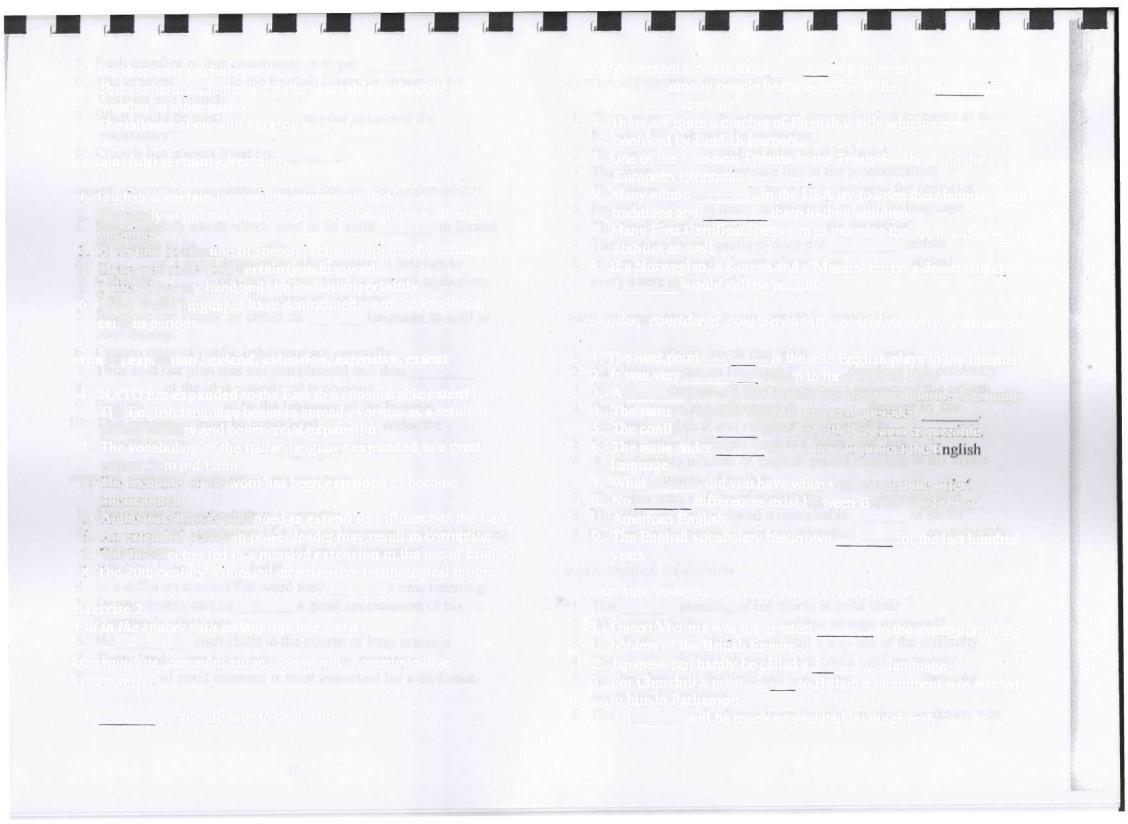
5.The shop sells various goods.
6.There is hardly a better word than variable to describe the weather in those parts.
7'. The talks went on with varying success.
certain, (un) certainty, certainly
1. English is certain to continue gaining ground.
2.Certainly in journalistic usage this word acquires a different
meaning.
! Л certain coarsening of speech is characteristic of our times.
4.There was some (un) certainty in his words.
5.I offered her my hand and she took it uncertainly.
6.Many world languages have contributed words to English at certain periods.
expand, expansion / extend, extension^ extensive, extent
1.NATO has expanded to the East to a considerable extent lately.
2.The English language began to spread overseas as a result of British military and commercial expansion.
3.The vocabulary of the Italian language expanded to a great extent from old Latin.
4.The meaning of the word has been extended to become international.
5.At the time Russia continued to extend its influence to the East
6.An extended period in power leader may result in corruption.
7.The Internet has led to a massive extension in the use of English.
8.The 20th century witnessed an extensive technological progress.
Exercise 2
Fill in the spaces with an appropriate word
#
communicate, communication, community, communicative, common (ly)
1. people are nice to deal with.
2. The present tense is more |
|
|
|
in a summary. |
|
|
||||||||||||
|
|
|
||||||||||||||||
3. |
|
|
among |
people becomes easier |
if they can |
m |
|
|||||||||||
|
|
a |
|
|
|
language. |
|
|
|
|
|
|
|
|
||||
|
|
|
|
|
|
|
|
|
|
|
|
|||||||
4. |
There are quite a number of English words which are |
|
|
|||||||||||||||
|
|
|
confused by English learners. |
|
|
|
|
|
||||||||||
5. One of the founding Treaties is the Treaty Establishing the |
|
|
||||||||||||||||
|
|
|
European Economic |
. |
|
|
|
|
|
|||||||||
|
|
|
|
|
|
|
|
|
|
|||||||||
6. |
Many ethnic |
|
|
in the USA try to keep their language and |
||||||||||||||
|
|
traditions and |
|
them to their children. |
|
|
||||||||||||
7. |
Many First Certificate tests aim to examine the applicant's |
|
__ |
|||||||||||||||
|
|
|
abilities as well. |
|
|
|
|
|
|
|
|
|
||||||
8. If a Norwegian, a Korean and a Masai were on a desert island. |
|
|||||||||||||||||
|
|
|
|
|
|
|
would still be possible. |
|
|
|
|
|
||||||
consider, considered, consider ation(s), considerablefly), considerate
1. The next point |
|
|
|
|
|
_ is the role English plays in the Internet, |
||||||||||
2. |
It was very |
|
|
|
|
|
|
|
|
of him to have offered help. |
||||||
3. |
A part of |
|
Little Britain was destroyed during Na/i raids. |
|||||||||||||
|
|
|
|
|
|
|
|
|
|
|
||||||
4. |
The status of spoken English has been upgraded |
|||||||||||||||
5. |
The conflict |
|
|
|
|
must be settled as soon as possible |
||||||||||
6. |
The issue under |
now is how to protect the E |
||||||||||||||
|
language. |
|
|
|
|
|
|
|
|
|
|
|
||||
1. |
What |
|
|
|
|
did you have when you rejected the offer/ |
||||||||||
8. No |
|
differences exist between British English and |
||||||||||||||
|
American English. |
|
|
|
|
|||||||||||
9. |
The English vocabulary has grown |
|
for the last hundred |
|||||||||||||
|
years. |
|
|
|
|
|
|
|
|
|
|
|
||||
contribute, contribution, contributor (s), contributory |
||||||||||||||||
1. |
Queen Victoria was the greatest |
to the expansion of the |
||||||||||||||
|
borders of the British Empire. |
|
|
|||||||||||||
2. |
Japanese can hardly be called a |
|
language. |
|||||||||||||
3. |
For Churchill's great |
|
to Britain a monument was erected |
|||||||||||||
|
to him in Parliament. |
|
|
|
|
|
||||||||||
4. |
All |
|
will be much appreciated by the church. |
|||||||||||||
16 |
17 |
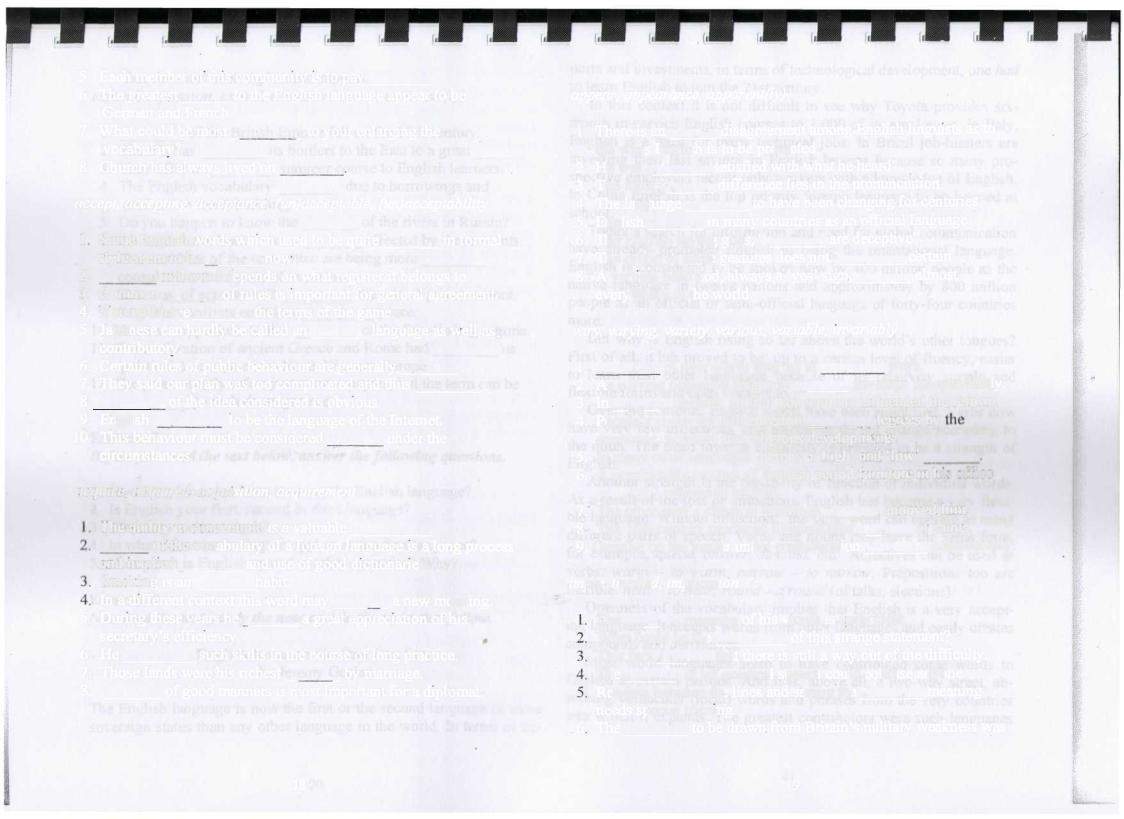
5. |
Each member oi this community is to pay |
|
|
. |
|
|||||
6. |
The greatest |
|
to the English language appear to be |
|||||||
|
German and French. |
|
|
|
|
|
|
|
||
7. |
What could be most _ |
|
_ to your enlarging the |
|||||||
|
vocabulary? |
|
|
|
|
|
|
|
||
8. Church has always lived on |
|
|
|
|||||||
accept, accepting, acceptance, (un)acceptable, |
(nn)acceptability |
|||||||||
I |
Some English words which used to be quite |
|
|
in formal |
||||||
|
style seem to be |
|
|
now. |
|
|
|
|
||
2.of a word depends on what register it belongs to.
3. |
Common |
of rules is important for general agreement. |
|||||||||
|
|
|
|
|
|
|
|
|
|
|
|
4. |
You will have |
|
|
the terms of the game. |
|
|
|||||
5. |
Japanese can hardly be called an |
language as well as |
|||||||||
|
contributory. |
|
|
|
|
|
|
|
|
||
6. |
Certain rules of public behaviour are generally |
|
. |
|
|||||||
7. |
They said our plan wras too complicated and thus |
|
|
. |
|||||||
8.of the idea considered is obvious.
9. |
English |
to be the language of the Internet. |
|||||||||||||
10. |
This behaviour must be considered |
under the |
|||||||||||||
|
circumstances. |
|
|
|
|
|
|
|
|
|
|
|
|
||
acquirt, acquired |
acquisition, |
acquirement |
|
|
|||||||||||
|
The ability to concentrate is a valuable |
. |
|||||||||||||
|
|
|
|
|
|
|
|
|
|
|
|
|
|||
|
Of (he vocabulary of a foreign language is a long process |
||||||||||||||
|
and implies |
|
__ and use of good dictionaries. |
||||||||||||
|
|
|
|
|
|
|
|
|
|
|
|
|
|
|
|
|
Smoking is an |
|
|
|
|
habit |
|
|
|
|
|
|
|
||
|
In a different context this word may |
|
__ a new meaning. |
||||||||||||
5. |
During these years he |
|
|
a great appreciation of his |
|||||||||||
|
secretary's efficiency. |
|
|
|
|
|
|
|
|||||||
6- He ___________ such skills in the course of long practice. |
|||||||||||||||
7. |
Those lands were his richest |
|
|
|
|
__ by marriage. |
|||||||||
8- |
_______„ of good manners is most important for a diplomat. |
||||||||||||||
appear, |
|
|
|
appearance, |
|
|
apparently) |
|
|
|
|
|
|
|
|
|
|
|
|
|
|
|
|||||||||||||
1. |
There is an |
|
|
|
|
|
|
|
|
disagreement among English linguists as to |
|||||||||||||||||||||||||
|
the ways English is to be protected. |
|
|
|
|
|
|
|
|||||||||||||||||||||||||||
2. |
He was _________ satisfied with what he heard. |
||||||||||||||||||||||||||||||||||
3. |
The most |
|
|
|
|
|
|
|
|
difference lies in the pronunciation. |
|||||||||||||||||||||||||
4. |
The language |
|
|
|
|
to have been changing for centuries. |
|||||||||||||||||||||||||||||
|
|
|
|
|
|
|
|
|
|
|
|
|
|
|
|
|
|
|
|
|
|
|
|
|
|
|
|
|
|
||||||
5. |
English |
|
|
|
|
|
|
in many countries as an official language. |
|||||||||||||||||||||||||||
6. |
The English saying goes, " |
|
|
|
|
|
are deceptive". |
||||||||||||||||||||||||||||
7. |
The origin of some gestures does not |
|
|
|
|
certain. |
|||||||||||||||||||||||||||||
8. |
A vertical head nod, always a 'yes' sign, |
|
|
|
|
almost |
|||||||||||||||||||||||||||||
|
everywhere in the world. |
|
|
|
|
|
|
|
|
|
|
|
|
|
|
|
|||||||||||||||||||
vary, |
varying, |
|
variety, |
|
|
various, variable, invariably |
|||||||||||||||||||||||||||||
1. |
|
|
|
|
|
|
|
of new words may go in |
|
|
ways. |
||||||||||||||||||||||||
2. |
As a living organism language |
|
|
|
|
|
|
|
|
develops independently. |
|||||||||||||||||||||||||
3. |
In |
|
|
|
|
|
|
|
|
degrees,, all four conceptions influenced the reform. |
|||||||||||||||||||||||||
|
|
|
|
|
|
|
|
|
|
|
|
|
|
|
degrees by |
||||||||||||||||||||
4. |
People's views are influenced in |
|
|
||||||||||||||||||||||||||||||||
|
economic, political and religious developments. |
||||||||||||||||||||||||||||||||||
5. |
In many other languages there is a 'high' |
and l o w ' |
|||||||||||||||||||||||||||||||||
6. |
A comfortable mixture of English period furniture in Ins office |
||||||||||||||||||||||||||||||||||
|
_____ |
|
|
|
|
|
|
impressed visitors. |
|
|
|
|
|
|
|
|
|
|
|
|
|
|
|
||||||||||||
7. |
The other man's classical quotation |
|
|
|
annoyed him. |
||||||||||||||||||||||||||||||
8. |
The |
16th century produced a remarkable _______ of saints. |
|||||||||||||||||||||||||||||||||
9. |
Opinion on the matter under consideration |
|
|
|
|
|
|
considerably. |
|||||||||||||||||||||||||||
imply, |
|
|
implied, |
|
implication |
|
|
|
|
|
|
|
|
|
|
|
|
|
|
|
|||||||||||||||
|
The |
|
|
|
|
|
|
|
meaning of his words is quite clear. |
||||||||||||||||||||||||||
|
|
|
|
|
|
|
|
|
|
|
|
|
|
|
|
||||||||||||||||||||
|
What could be the |
|
|
|
|
|
|
|
of this strange statement? |
||||||||||||||||||||||||||
|
This fact |
|
|
|
|
|
|
that there is |
still a way out of the difficulty. |
||||||||||||||||||||||||||
|
|
|
|
|
|
|
|
|
|
|
|
|
|||||||||||||||||||||||
|
The |
|
|
|
|
|
|
|
in his political speech could confuse anyone. |
||||||||||||||||||||||||||
|
Reading between the lines and seeing the |
|
|
|
|
|
meaning |
||||||||||||||||||||||||||||
|
needs special training. |
|
|
|
|
|
|
|
|
|
|
|
|
|
|
|
|||||||||||||||||||
6 |
T h e |
_ _ _ _ _ _ t 0 be drawn from Britain's military weakness was |
|||||||||||||||||||||||||||||||||
18 |
19 |
